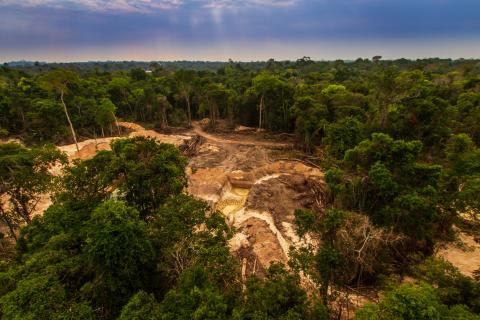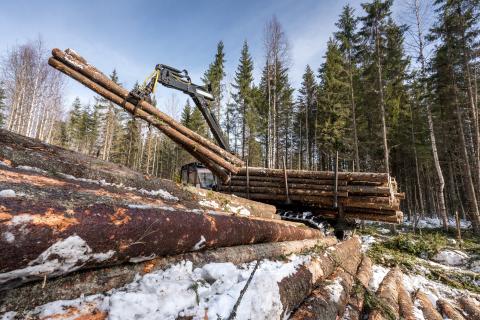Interpol enters battle against forest crime
Those who seek to raise their fortunes based on forest crime may not find their chosen career quite as convenient and fruitful in future as they have been accustomed to.
INTERPOL has joined forces with the United Nations Environment Programme (UNEP) to launch the project LEAF – Law Enforcement Assistance for Forests, which aims to take the combat against illegal logging to a higher level. The project consists in a powerful mixture of transnational, coordinated actions to track down and prosecute high-class forest criminals.
Forest mafia the main target
Davyth Stewart, Criminal Intelligence Officer of INTERPOL and Team Leader of Project LEAF, explains:
“INTERPOL takes a holistic approach to combating forestry crime. Forestry crime is big business, highly organised, and strategic. We are going after the ‘big fish’, the forest mafia. Illegal logging is theft of a country’s natural resources, and usually from some of the poorest countries that need access to their resources if they are going to be brought out of poverty”.
INTERPOL estimates that theft to be at least 10 billion US dollars each year and probably higher than 30 billion dollars. According to the the organisation, criminals involved in illegal logging include transport companies; saw mills, ports and shipping companies and timber importing and processing companies.
National law enforcement in focus
INTERPOL’s programme will support investigations into each part of this supply chain. “There are a lot of criminals involved, a lot of targets. Our role will be to facilitate this investigation process”, says Mr Stewart. “We will be channelling resources and focussing our support for countries that are proactive and vigorous in their approach to illegal logging. Forestry crime has gone undetected for a long time, and in the past not enough police resources have been allocated to this type of criminality”.
Enforcement on the ground including arrests and prosecution will be undertaken by the member countries themselves. INTERPOL’s role will be to coordinate trans-boundary operations to help those countries detect, arrest and formally charge criminals. “Within the next 12 months, our programme would like to see a significant increase of law enforcement focus on forestry crime resulting in a significant crack down at the national level by our member countries, leading to arrests and prosecutions”, says Mr Stewart.
A vital part in the strategy of the INTERPOL is the establishment of a global network of National Environmental Task Forces (NESTs), a process which is already on-going. INTERPOL has also been working with various countries to host national environmental security seminars, bringing together different government agencies and experts to facilitate the establishment of law enforcement taskforces to tackle environmental crime.
Tracing the money
How will the project work to detect forest crime? Mr Stewart: “The people with the chainsaws are often at the bottom of a large mafia-like network of organised crime. We are after those at the top. These people often keep as much distance as possible between themselves and the illegal timber harvesting, but the money still flows to them and they can be linked to the crime through tracing the proceeds”.
INTERPOL will encourage its member countries to undertake national tax fraud investigations with a particular focus on timber plantations and sawmills involved in timber and money laundering, under or over reporting of volumes of timber, altered invoices, tax fraud and misuse of government subsidies.
The World Bank supports a global programme of technical assistance on anti-money laundering and has played a leading role in international efforts to strengthen forest law enforcement and governance. INTERPOL will work with the World Bank, through the International Consortium on Combating Wildlife Crime (ICCWC), to assist in handling financial offenses which are tied to environmental crime, such as money laundering and tax fraud.
Using high-tech intelligence
INTERPOL is also developing an intelligence database looking at how illegal timber is laundered from harvesting, transport out of forests and through its trade routes. The organisation is looking into the use of techniques such as satellite and GPS tracking mechanisms and DNA analysis. INTERPOL says it intends not only to track illegal timber, but also the shipping and transit routes.
“In order to maximise the success of using the latest technology, our programme is exploring collaboration with different government agencies. In collaboration with the World Customs Organisation we will also work with customs and border control to tackle illicit cross border trade routes”, explains Mr Stewart.
INTERPOL will support its member countries to establish multi-agency taskforces that bring together all law enforcement and compliance agencies responsible for environmental crime. This will include national police, forest authorities, and customs and border control to tackle the illicit international trade in timber.
Illicit timber trade - an ignored issue
“Timber as a commodity is lagging behind other consumer commodities in terms of traceability and law enforcement. But focus is now growing worldwide in terms of consumer awareness as well as legislation and other initiatives in the world’s key importing countries”, says Mr Stewart.
He concedes that the project requires time to achieve all its objectives: “These investigations take time, a lot of patience, and a lot of commitment. But we are in this for the long haul. We are looking to develop the project into a fully-fledged programme”.
About the project partners
INTERPOL is the world’s largest police organisation, with 190 member countries. INTERPOL is a member of the International Consortium on Combating Wildlife Crime (ICCWC), which also includes the World Customs Organisation, the Convention on International Trade in Endangered Species of Wild Fauna and Flora (CITES) Secretariat, the United Nations Office of Drugs and Crime and the World Bank.
UNEP GRID Arendal – the direct UNEP project partner – is the organisation behind the seminal series of Rapid Response Assessment reports and other investigations on key environmental issues, including climate change, deforestation and environmental crime.
Project LEAF represents the first time organisations of the stature of INTERPOL and UNEP have joined forces against transnational organised forestry crime.
Source: Interpol



